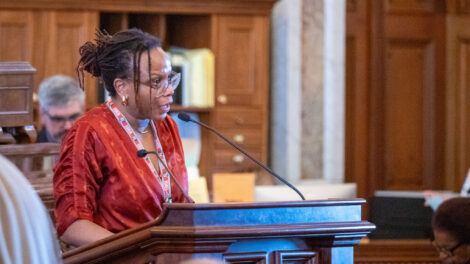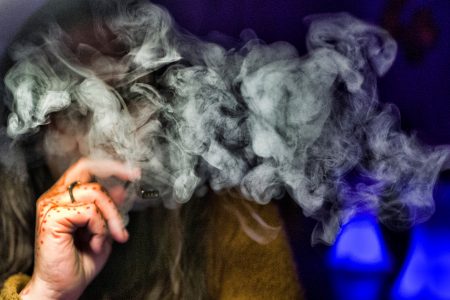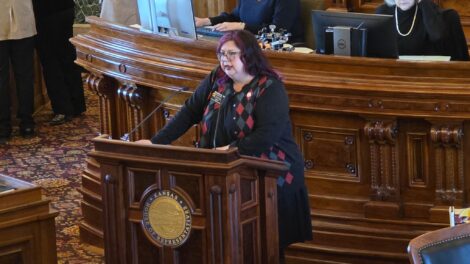Sen. Francisco calling for Kobach investigation after questions emerge about Republican strategist and his role in third-party politics

In this file photo from June 2015, Sen. Marci Francisco, D-Lawrence, right, discusses tax issues on the floor of the Kansas Senate.
Updated at 6:15 p.m. Wednesday, June 5:
Sen. Marci Francisco is calling for Kansas Attorney General Kris Kobach to investigate a prominent Republican strategist after questions have emerged regarding whether the strategist misrepresented himself as the chairman of the No Labels Kansas party.
The Kansas Secretary of State’s office on Wednesday provided a document to the Journal-World listing Kris Van Meteren as both the chairman of No Labels Kansas and the incorporator and director of No Labels Kansas Inc.
In that capacity, Van Meteren filed the paperwork that made Francisco, a longtime Democratic lawmaker from Lawrence, a No Labels candidate against her wishes. The filing was for Kansas Senate District No. 2, which Francisco currently holds as a Democrat and is seeking reelection for as a Democrat.
As the Journal-World reported on Tuesday, Francisco said she never sought the nomination from the No Labels party, and never authorized anyone to file paperwork saying she would serve as a candidate for the party.
Van Meteren — whose firm works with many of the state’s top elected Republicans, including U.S. Sen. Jerry Moran and U.S. Rep. Tracey Mann — filed the paperwork nominating Francisco in his capacity as chairman of the No Labels Kansas party.
But on Wednesday afternoon, Francisco told the Journal-World that she had received communication from the Kansas Secretary of State’s office that challenges Van Meteren’s standing as chairman of No Labels Kansas.
“The Secretary of State’s office has learned that (Kris) Van Meteren was not chair of the No Labels party,” Francisco told the Journal-World. “There is another chair.”
Late Wednesday afternoon, the Kansas Secretary of State’s office confirmed that it indeed had determined Van Meteren was not the valid chair of the No Labels Kansas party, and has determined that Francisco will not be listed as a No Labels candidate for the Senate district.
Van Meteren has not responded to interview requests from the Journal-World, but did copy the newspaper on an email response to the Kansas Secretary of State’s office, which challenged the Secretary of State’s office to prove that Van Meteren was not the valid chair of the No Labels Kansas party.
Francisco will remain on the ballot as a Democrat in the Senate race, where she will face Rep. Christina Haswood in a primary election in August.
But Francisco said there are now questions that need to be answered about why Van Meteren filed paperwork making her a nominee against her wishes. When Francisco originally thought that Van Meteren was the valid chair of No Labels Kansas, she called the situation “concerning.”
Now that she has received information questioning the validity of Van Meteren’s position of chair of the party, she told the Journal-World her concern is heightened.
“I think it is more shady than we thought,” Francisco said.
While Francisco did not speculate on whether Van Meteren had acted fraudulently in making the contested nomination, she said the matter deserves investigation.
“I’m hoping that the attorney general who is concerned about election fraud will look into this,” Francisco said.
Kobach, a Douglas County Republican, has gained a national reputation — first as Kansas Secretary of State and now as Kansas Attorney General — as a prosecutor of election law violations.
Wednesday’s revelation of the involvement of Van Meteren — who touts his firm, The Singularis Group, as one that promotes conservatives and conservatism — creates new questions about the motives behind both the Francisco nomination and the activities of the No Labels party in Kansas.
The news comes as Kobach announced that a second person from Florida has been arrested on suspicion of forgery related to petitions that were used in the process to certify No Labels as an official minor political party in Kansas, which gives the group access to the ballots that it would not have otherwise. Kobach alleges the Florida resident forged signatures on petitions that were later submitted as part of the certification process.
It is unclear what, if any role, Van Meteren had in directing the petition gathering process for No Labels Kansas. That is one of several questions the Journal-World is seeking to pose to Van Meteren, who has not agreed to an interview with the Journal-World.
Also unanswered is what type of process was used to select Francisco as the No Labels nominee for the Senate position. In the filing with the Secretary of State’s office, Van Meteren attested that Francisco was nominated through a “duly called convention,” but no details — such as the date or number of participants of the convention — were provided.
The filing has left the Kansas Secretary of State’s office with unanswered questions as well. When asked by the Journal-World whether state law allowed a party to nominate a person for political office without the consent of that individual, a spokesperson with the office said the answer was currently unknown.
“The law is unclear,” Whitney Temple, a spokesperson for the Kansas Secretary of State, said via email. “We are researching this now.”
The Secretary of State’s statement late Wednesday afternoon did not settle that issue. Francisco’s name was not removed from the ballot because she had not consented to be the party’s nominee, but rather due to Van Meteren’s lack of authority.
The political ramifications of the answer could be significant in Kansas. As the Journal-World reported Tuesday, the Francisco incident shows how political strategists could use the law to co-opt the political brand of a politician in an effort to split voting constituencies.
Francisco, who has been serving in the Kansas Statehouse as a Democrat since 2005, has strong name recognition with Democratic voters in her Senate district. However, she also is facing a formidable opponent in the Democratic primary, Haswood.
If Haswood defeats Francisco in the August primary, Haswood’s name would appear on the November ballot as the Democratic nominee. But, under state law, there was a real chance that Francisco’s name would appear on the November ballot as the No Labels nominee, even if Francisco wanted her name removed from the ballot. Francisco and Haswood then conceivably could split the Democratic vote, which presumably would be a benefit to the lone Republican in the race, Lawrence resident David Miller.
Even though her issue has been resolved, Francisco said the issue of how someone can be nominated as a third-party candidate should be reviewed by lawmakers. She said she found it troubling that an individual could become a nominee for a political position against their wishes.
Douglas County Clerk Jamie Shew — who played no role in accepting the No Labels filing in the Senate race but is the county’s chief elections officer — said it is hard to believe that state law would allow parties to simply nominate people for a candidacy without the person’s permission.
“You almost could use it as a way to retaliate against someone,” Shew said.
For example, certain professions would find it professionally harmful to be seen as a political candidate. Shew noted that federal employees generally are prohibited from running for partisan political offices under the Hatch Act.
In addition to the Francisco nomination, Van Meteren also filed paperwork with the Secretary of State’s office saying that Echo Van Meteren was the No Labels nominee for Kansas Senate District No. 5. Echo Van Meteren is the wife of Kris Van Meteren. Echo Van Meteren also is a candidate in the Republican primary for Senate District No. 5, where she is facing a Republican challenger.
If Echo Van Meteren had not been removed as the No Labels candidate, it potentially would have created a scenario where Echo Van Meteren lost her Republican primary contest for the Senate seat, but then simply ran again in the general election as the No Labels candidate. Shew said he thinks there is a state law that would have prohibited that scenario, but the details are unclear, he said.
Shew said it is likely that third party candidates are going to become more common in future elections, which he said should spur legislators to look more closely at the laws that govern them.
“I think there are a lot of questions about how all of this is going to work,” Shew said.




